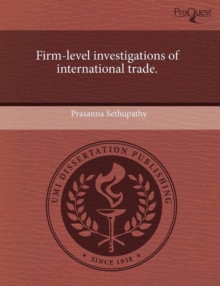By almost any measure, globalization has increased tremendously over the last few decades.
World trade of goods and services, and financial flows have risen, while costs of transportation, communication and information, and tariffs have fallen.
In conjunction with the growth of globalization has been the development of the new trade theory in the subfield of international trade within economics.
The new trade theory extends classical theory to consider imperfect competition, spillovers, and heterogeneous firms.
I place my dissertation in the context of this new trade theory to try and better understand the implications of trade in a variety of areas.
My first chapter, Offshoring, Wages, and Employment: Theory , develops a theoretical framework to understand the implications of offshoring on domestic wages and employment at the firm-level.
The main intuition from this model is that new offshoring opportunities provide an efficiency boost to offshoring firms relative to non-offshoring firms.
This in turn increases the profitability of the former at the expense of the latter and consequently domestic wages are predicted to rise at the former and fall at the latter.
This prediction is consistent with empirical findings that within-industry wage inequality has been rising in many different countries.
Finally, the model predicts that domestic employment could in fact rise at offshoring firms as expansion due to the efficiency boost could offset the loss of offshored jobs.
However, the model definitely predicts that domestic employment would fall at non-offshoring firms, which lose market share and contract.
My second chapter, Offshoring, Wages, and Employment: Empirical Evidence, uses firm-level data on US multinationals from the Bureau of Economic Analysis to test some of the predictions from the first chapter.
To demonstrate that offshoring is causally linked to outcome variables, I take advantage of a new FDI law and a currency depreciation in Mexico as exogenous shocks that lower the cost of offshoring for US multinationals to Mexico.
Then, I am able to show that domestic wages at US firms who were more likely to take advantage of this shock rose by over 6% relative to firms unlikely to take advantage of this shock, during the 1993--97 period.
This finding is consistent with the prediction from chapter 1.
Furthermore, though employment falls at both types of firms, I find that it does not fall any further at the former set compared to the latter set.
My third chapter, Does Exporting Lead to Productivity Spillovers in Horizontal or Vertical Industries?
Evidence from Indonesia, tackles a different question related to trade.
Many, including the World Bank, have partly attributed the successes of East Asian economies in the second half of the 20th century to export-led growth.
The question I want to ask is whether export promotion policies were warranted.
Previous work has argued that export promotion policies could be welfare enhancing in an environment of learning from exporting and spillovers.
Using plant-level panel data from Indonesia, I find that plants received a one-time productivity boost from entry into exporting---evidence of learning from exporting.
Further, I find that downstream plants also benefited---evidence of productivity spillovers.
Together, this is taken as evidence that in the case of Indonesia, learning by exporting and spillovers existed and hence export promotion polices would have been justified.
I believe that my dissertation work sits at the intersection of academia and policy.
First, it is part of the frontier of the new trade theory in the academic literature.
Second, it tackles questions that are...

